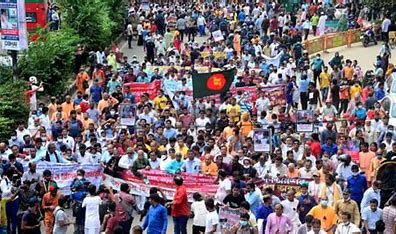If infantilism had a face, it would be that of Bangladesh. At one level, it is amusing to see the tirade coming from across the border. Day in and day out Indians are being threatened that Kolkata would be taken over in four days by Bangladeshi forces; that the Northeast will be separated from the rest of India; India’s economy will be destroyed by purchasing goods from other countries—all of which amounts to daydreaming. But what is not amusing is that this jingoism is being mainstreamed and the minorities, particularly Hindus, are paying a high price for this. The attack on Bangladeshi minorities has to be seen in the context of a country which has low self-esteem and is suffering from an acute inferiority complex, and is thus boosting its ego by hurting the softest of targets, the people who follow a different religion. But this is also symptomatic of the radicalization of a section of Bangladeshi society. Gone are the days when the students of Dhaka University would sit in protest against radical Islamists who were attacking atheists, chopping off their hands. It is the same Dhaka University that has been captured by the radical Jamaat’s students’ wing. In 2024, it is the students who control Bangladesh’s streets, running amok, and resorting to mob rule. The latest demand coming from the streets is that no-beef restaurants should be banned in Bangladesh, which, if implemented means barring Hindus from public space. It is this radical mindset that is creeping into the rhetoric of Bangladesh, and worse, has started directing policy, which is becoming congruent with Pakistan’s anti India stance. Hence, what we are witnessing is a coming together of Bangladesh and Pakistan, even though it was the latter that subjugated the people of the then East Pakistan for decades, and was the worst kind of oppressor. But now that the collaborators with the Pakistanis, the Razakars are at the centre of power in Dhaka, the ISI has its men in place to needle India along our eastern borders.
Given that there is no parity between India and Bangladesh in any sphere, it would take oodles of imagination to believe that Bangladesh can pose a military threat to India. And this even if it decides to revive its airbase at a place called Lalmonirhat, near India’s Siliguri Corridor, popularly known as chicken’s neck, or place missiles along the border. If it is foolish enough to pursue the path of trying to contain India militarily, it will have to pay a very heavy price for that. Pakistan has destroyed its economy and its country by trying to keep up with India militarily. It has gone bankrupt over the years. A similar fate awaits Bangladesh, which anyway is in trouble economically. But Bangladesh now allows Pakistani vessels to berth in its ports, has stopped the security checks of Pakistani nationals, and according to latest reports, its Chief of General Staff, Lt Gen Mizanur Rahman Shamim is visiting Pakistan to meet his counterpart there.
The worry for India in such a situation is not about any possible build-up in conventional warfare capabilities—for what Bangladesh is doing is mere posturing—but what enemy countries do to bridge the gap when there is a lack of parity—which is, use terrorists as proxy. Iran is doing it with Israel, Pakistan is doing it with India, and now Bangladesh’s so-called strategic thinkers are openly calling for stoking the flames of insurgency in the Northeast, while also talking about using terrorists against India. Terrorism is a low-cost enterprise, but has the potential to inflict disproportionate harm to the civilian population of the target country, and that is what India should be worried about. India’s Foreign Secretary Vikram Misri would have certainly raised this concern with Bangladesh, but there is a huge question mark if he will be taken seriously. The only possible way to bring Bangladesh back to its senses are economic measures that amount to sanctions. After all, a country surrounded on three sides by one of the major world powers, cannot afford to misbehave.
In conclusion, it is sad to see how religious identity has trumped Bangladesh’s linguistic identity, especially since the whole premise of the freedom movement of that country was based on language—on a proud people’s refusal to sacrifice their language, Bengali, at the altar of a Pakistani imposition, Urdu, which is alien to the land. Now that radical Bangladeshis are rediscovering their ties with Pakistan, it is only the common people who will suffer. Even a small matter of skyrocketing prices can affect them. In their attempt to teach India a lesson, Bangladesh’s rulers will end up hurting their own people the most.





